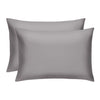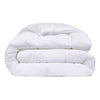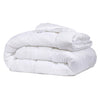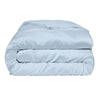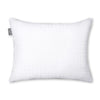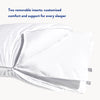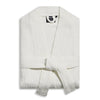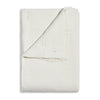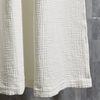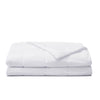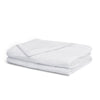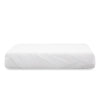The Daily Miracle
The Difference Between Bamboo vs. Cotton Sheets Explained
Published
January 05, 2023
Author
Bridget Reed

Bamboo sheets are new to many of us, but they are becoming very popular. With the bedding industry already saturated with lots of different kinds of materials, more options can make buying new bedding even more confusing.
Bamboo and cotton sheets are both soft, durable, and comfortable bedding options, but you may favor traditional cotton sheets when you see them compared side by side.
There are two types of bamboo sheets to choose from and numerous types of cotton sheets. To fully grasp the difference, we must break down the bamboo and cotton types.
What Are the Different Types of Cotton?
Cotton is a fibrous substance used as textile fabric. Cotton grows in a boll, which is meant to protect the seeds of its plant. Humans have found another use for it: the cotton plant is harvested and used to create fabric and thread.
Different types of cotton produce different fabric types; some are better than others. Here are a few cotton types you may have heard of:
Organic Cotton
Cotton is sometimes associated with heavy water use or negative environmental impacts. To combat this, look for sheets labeled Oeko-Tex Certified: the cotton used to make these sheets (and the manufacturing process) is free from harsh chemicals.
Egyptian Cotton
Egyptian cotton has a reputation for being some of the most luxurious, breathable, and silkiest bedding you can buy. However, beware before you buy, as products labeled “Egyptian Cotton” aren’t always genuine.
Most Egyptian cotton sheets have a blend of fabrics to cut costs. However, actual Egyptian cotton can cost up to $500.
Regular Cotton
Regular cotton is standard, American-grown, non-organic cotton.
Pima Cotton
Pima cotton is a popular Peru-grown cotton known for its extra-long-staples, breathability, and moisture absorption.
Supima Cotton
Supima cotton is an American-grown product derived from the Pima cotton family. Supima cotton is trademarked and must pass an authentication process before being sold.
Supima is a premium natural fiber and is often grown on family-owned farms. These farms set environmental and ethical standards to help make Supima more eco-friendly.
Supima fibers are generally 35 percent longer than most cotton, making them 45 percent stronger. This type of fabric also has a luxurious touch and becomes softer after each wash. When it comes to cotton, Supima is the superior option.
Unlike Egyptian cotton, all Supima cotton must be an extra-long staple. Egyptian cotton doesn’t dictate the class of cotton necessarily — most Egyptian cotton is regular or long staple only.
What Are Bamboo Sheets?
As bamboo fiber sheets gain popularity, it’s important to know precisely what they are before you decide they’re the right sheets for you.
The terms bamboo rayon and bamboo viscose are used interchangeably but are not the same thing. For the purpose of this article, we’re classifying both as coming from regenerated cellulose fiber.
While regenerated cellulose fiber is similar to cotton, extracting the fibers to produce bamboo sheets is a very different, more involved process. Cellulose-based fibers are extracted using chemical solvent systems making the regenerated fibers partially natural and part synthetic.
What Are the Different Types of Bamboo Sheets?
There are far fewer bamboo fabric types than cotton, which makes choosing the best fit even easier — that is, if you decide cotton isn’t your cup of tea, after all.
Non-Bast Bamboo Manufacturing Process
This type of bamboo fabric involves dissolving and reconstituting a bamboo plant. Non-bast bamboo sheets are made by spinning the plant to obtain the fibers used to weave bamboo fabric.
Bast Bamboo Manufacturing Process
Bast bamboo sheets are made by harvesting the bamboo plant's center, resulting in a fabric that is more like bamboo linen.
How Does Thread Count Factor In?
Whether bamboo or cotton, the thread count plays a vital role in the quality of your bed sheets. It will help determine how breathable, soft, and durable the fabric is. Higher thread counts are often better (but not in every scenario).
Regarding Supima cotton sheets, we recommend 500-thread count sheets for an optimal appearance and touch. If you’re looking at bamboo sheets, a high thread count for bamboo bed sheets is about 300.
Bamboo vs. Cotton Sheets: How Do They Compare?
Let’s discuss the most prevalent differences between bamboo and cotton sheets.
Durability: Cotton
Not all cotton is created equal, meaning some cotton fabrics are more durable than others. The better the cotton, the higher quality of the fabric will be and the more durable it should be.
Of course, high-end cotton, like Egyptian cotton, is known for its luxurious appearance, but there are other wonderful kinds of cotton that won’t break the bank. For example, Supima cotton has similar features to Egyptian cotton for a relatively lower price.
If you choose our Miracle Sheets, you can expect your percale weave cotton sheets to last much longer than other cotton bedding; it's much stronger and will hold up against pilling, tearing, and stretching.
Durability: Bamboo
Bamboo sheets' durability is highly dependent on their production process. When made in a mechanical and non-chemical process, most of the strength is retained and carried over to the fabric.
The age of the bamboo plant upon harvest also plays a vital role in the fabric's strength and lifespan; the more mature, the better.
Softness: Cotton
High-quality cotton is considered the strongest and softest material on the market, making it ideal for sensitive skin. Supima is often made from Extra Long Staple (ELS) Gossypium Barbadense Cotton, which makes for breathable bedding with strong moisture-wicking abilities.
Softness: Bamboo
Like Supima cotton sheets, bamboo is very soft with moisture-wicking abilities. It’s also considered a temperature-regulating material, which contributes to its luxurious feel. Bamboo sheets have a soft and silky feel, similar to satin, and are often favored by hot sleepers for this reason (although people who are often cold at night might not like them).
Price Tag: The Best Cotton Sheets
While the price of cotton sheets varies drastically, you can get a set as cheap as $20 or as much as $300; it really depends on how much you’re willing to spend.
While you shouldn’t be stingy on your bedding, you can still get beautiful, high-quality sheets for an affordable price. Both bamboo and cotton sheets have pros and cons, but when you shop for our antibacterial cotton sheets, you can get all the wonderful qualities (and more) that come with bamboo bedding for a fraction of the cost.
Price Tag: The Best Bamboo Sheets
The most significant difference between bamboo and cotton sheets is the cost. No matter the fabric, if you want good-quality sheets, it may be an investment; a good bamboo sheet set could cost upwards of $400.
Which Is the Winner: Bamboo vs. Cotton Sheets?
While both bamboo and cotton sheets are breathable, durable, and soft, bamboo is often developed with chemicals, is much more expensive, and tends to wrinkle easily. If you’re looking for luxurious sheets without that luxurious price tag, percale or sateen weave cotton sheets may be the option for you!
What About Your Comforter?
Now that you’re a sheet expert, it's time to get your other bedding up to date — we’re talking about your comforter. Whether you’re loyal to your bamboo bedding or feel it's time to upgrade to premium cotton, you can make an educated decision.
Cotton for the Win
While your mattress, comforter, and overall ambiance of your room are essential for your mental health and sleep schedule. Overall, your sheets are equally as important.
Having sheets you love makes the simple act of sleeping feel like a treat. Before you dedicate all your ZZZs to a set of sheets you don’t absolutely love, ensure you do your research. You won’t regret it.
Sources:
OEKO-TEX® standards at a glance | OEKO-TEX®


